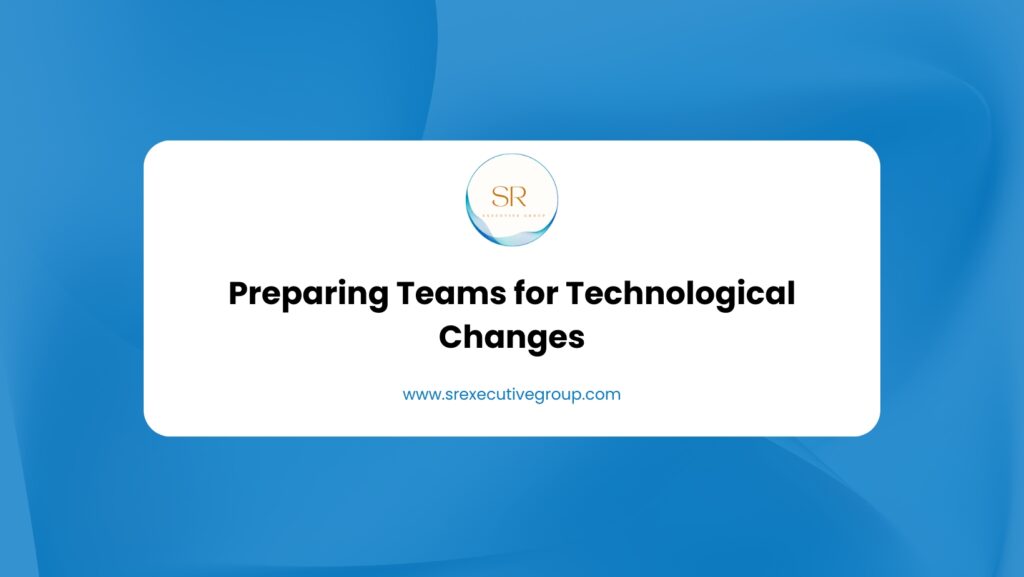The rapid pace of technological advancements is transforming industries at an unprecedented rate, and tech companies must constantly evolve to stay competitive. While adopting new technologies can offer significant advantages, the success of these changes depends largely on how well teams are prepared to embrace them. Without proper preparation, technological shifts can lead to resistance, confusion, and even decreased productivity.
Let’s explore effective strategies for preparing teams for technological changes, ensuring a smooth transition and long-term success.
1. Communicate the Benefits of Change
The first step in preparing your team for technological changes is clear and transparent communication. Employees are more likely to embrace new technologies when they understand how these changes will benefit them and the company. Whether it’s improving efficiency, streamlining workflows, or reducing manual tasks, clearly outlining the benefits will help reduce resistance.
It’s important to communicate not only what the changes are, but why they’re necessary. For example, if adopting a new software platform will allow for faster project delivery or better customer service, explain how this impacts the company’s overall goals. Engaging your team in open conversations about the benefits of change can make them feel more involved and invested in the transition.
If you need support with change management and communication strategies, SR Executive Group’s consulting services can help guide you through the process.
2. Involve Your Team Early
Involving your team in the decision-making process early on can significantly improve the success of implementing new technologies. When employees feel like they have a say in the changes, they’re more likely to support them. This involvement can include seeking feedback on potential technology solutions, conducting pilot programs, or allowing team members to test new tools before they’re fully implemented.
By engaging your team early, you not only gather valuable input but also create a sense of ownership over the changes. This approach can reduce resistance, as employees feel more connected to the transition.
SR Executive Group offers group coaching sessions that help tech leaders involve their teams in decision-making processes, fostering a more collaborative environment.
3. Provide Comprehensive Training
One of the most common reasons employees resist technological changes is a lack of understanding or fear of the unknown. Providing comprehensive training is essential to helping your team feel confident and comfortable with new technologies. Training should be tailored to the needs of different team members, ensuring that everyone, regardless of their role, understands how to use the new technology effectively.
This can include hands-on workshops, online tutorials, or one-on-one coaching sessions. Make sure training is ongoing and accessible so that employees can continue to build their skills as they adapt to the new tools. Continuous support is key to ensuring that the transition is smooth and that productivity isn’t disrupted.
For help creating tailored training programs, SR Executive Group provides coaching services that focus on employee development during technological transitions.
4. Foster a Culture of Adaptability
The tech industry is ever-changing, and fostering a culture of adaptability is essential for keeping your team agile in the face of technological advancements. Encourage your employees to embrace change as a natural part of growth and success. Create an environment where curiosity, innovation, and continuous learning are prioritized.
Leaders play a critical role in modeling adaptability for their teams. By demonstrating a positive attitude toward new technologies and showing a willingness to learn, leaders can inspire their team members to do the same.
If you’re looking to cultivate a culture of adaptability in your organization, SR Executive Group offers executive coaching to help leaders foster environments where adaptability and innovation thrive.
5. Monitor Progress and Provide Ongoing Support
The implementation of new technologies is not a one-time event—it’s an ongoing process. After the initial rollout, it’s important to monitor progress, track performance metrics, and gather feedback from your team. Are employees using the technology effectively? Are there any roadblocks or challenges? Regular check-ins and open communication ensure that any issues are identified early and addressed promptly.
Provide ongoing support to ensure that your team continues to succeed with the new technology. This could include offering additional training sessions, setting up a help desk, or appointing “technology champions” within the team who can assist their colleagues.
For guidance on providing ongoing support during technological changes, SR Executive Group can assist with tailored coaching and consulting services to meet your company’s needs.
Best Practices for Managing Technological Change
Preparing teams for technological change requires thoughtful planning and execution. Here are some best practices to ensure a smooth transition:
1. Set Clear Expectations
From the outset, communicate what is expected of your team during the transition. Outline timelines, key milestones, and the goals you hope to achieve. Setting expectations helps reduce uncertainty and keeps everyone aligned.
2. Celebrate Small Wins
Change can be challenging, but celebrating small wins along the way helps boost morale and keeps the team motivated. Recognize progress, whether it’s completing a training session or implementing a new feature of the technology.
3. Stay Open to Feedback
Creating a feedback loop allows employees to share their experiences, voice concerns, and suggest improvements. Being receptive to feedback shows your team that their opinions are valued and that you’re committed to making the transition as smooth as possible.
4. Lead by Example
As a leader, your attitude toward technological changes will influence how your team responds. Demonstrate enthusiasm for the new technology, participate in training sessions, and show that you’re willing to adapt alongside your team.
Preparing teams for technological changes is essential for ensuring a smooth transition and maximizing the benefits of new technologies. By focusing on clear communication, involving your team early, providing comprehensive training, fostering adaptability, and offering ongoing support, tech leaders can successfully guide their teams through change.
If you’re ready to lead your team through a technological transformation, SR Executive Group offers coaching and consulting services designed to help you manage change effectively and build a team that embraces innovation.





